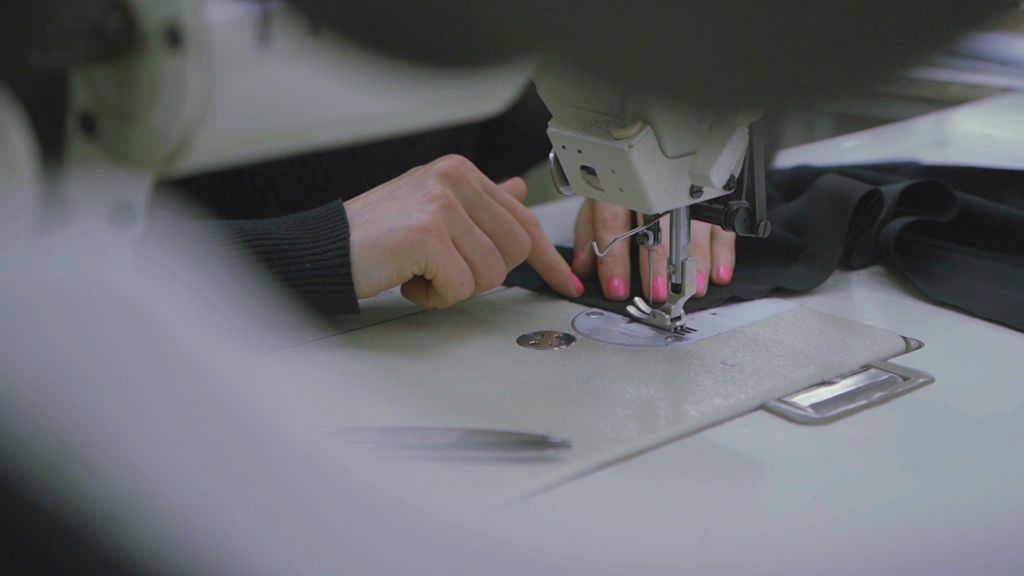Wright.
Who is… Wright.?
The Belgian women’s fashion label Wright. wants to do things ‘right’ – with timeless, luxurious, and yet very wearable slow fashion that encourages us to shop consciously.
It’s equally appropriate that ‘wright’ is an old English word for ‘craftsman’, seeing that the label makes all its items in an in-house atelier and attaches a lot of importance to craftsmanship and premium materials. This approach results in comfy, sophisticated silhouettes that can be worn both casually and for special occasions.

![]()
Resources
Monomaterials and smart blends
Wright. tries to use as many natural and recycled fibers as possible, as well as monomaterials, because they tend to be easier to recycle. 30% of Wright’s Summer 2021 collection, for instance, consisted of 100% natural materials like cotton, silk or linen, while 40% was made with recycled or FSC certified fabrics. Yet Wright. doesn’t shy away from blends either. The idea is to make smart choices in that respect, for example by opting for blends with polyester or polyamide to create very durable fabrics – hence, longer-lasting clothes. Finding the right balance is key for Wright.
![]()
Design
High-quality, timeless and seasonless designs
‘What is the customer looking for?’ To avoid creating stocks of unwanted clothing, this question is always the starting point for the Wright. designers. Furthermore, they remain faithful to their idea of creating timeless items that customers can wear for ages and throughout all seasons, and which are easy to mix and match. That’s exactly why the team selects high-quality fabrics, as well as devoting a lot of care to the finishing touches. Finally, Wright. is planning on using leftover fabrics in new designs, and on redesigning and upcycling excess stock.
![]()
Production
On-demand production at Wright.’s own site
Wright. produces on demand. By manufacturing only what customers want and by making sure its production lines can be easily adapted, the brand limits its stocks, both of textiles and finished products. The Wright. production takes place in Europe, on their own site in North Macedonia. This enables the brand to shorten the chain and to keep a close eye on the production and samples departments. Wright. also consolidates shipments to and from the site. In addition, the brand invests in awareness raising, giving production teams a lot of responsibility to tackle sustainability goals and allowing them to work autonomously.
![]()
Retail
Maximum transparency and ‘Archive sales’
Wright. aims for maximum transparency, with QR codes that customers can scan to get a detailed timeline of their item, including dates, production phases, and the teams responsible for them. So, consumers know exactly where their clothes were made, and by whom. Moreover, unsold items from previous seasons are not stashed in the proverbial attic but offered as ‘Archive sales’. Lastly, Wright. is looking for ways to do better in terms of packaging material, for instance by shifting from single-use poly bags to a circular system and by reusing clothes hangers.
![]()
Consumption
Maintenance tips, and repair service in the pipeline
Wright. wants customers to enjoy their favorite items for as long as possible, sharing washing instructions and maintenance tips. And there’s more to come: Wright. is currently working on a repair service and a system that would tell customers exactly how many times they have worn a certain item.
![]()
End of life
Take-back system and plans to turn old clothing into a resource stream
Keeping clothes in the consumption phase: that’s what Wright. is after. But no item lasts forever, obviously. That is why the brand encourages customers to bring used clothes to collection points – an important step, yet the team realizes they still have a long way to go to turn those items into a true resource stream. That is why they are planning to team up with strategic partners.

What challenges are you currently facing?
De Nil: “The biggest challenge ahead of us involves the moment a product reaches the end of its life. We have to get organized and implement the opportunities we have identified. In addition, we are looking into more sustainable packaging options, because we want to stop relying on single-use plastics.”
Nathalie De Nil (founder and CEO Wright.)
What does sustainability mean for you?
Nathalie De Nil: “Sustainability is a concept that we want to apply throughout our business, on all levels. When it comes to sustainable management, you need to get everyone and everything involved – both inside and outside your organization: from the partners you collaborate with to the production processes you analyze. We keep questioning ourselves and strive for continuous improvement, meaning a more environmentally conscious and socially responsible entrepreneurship.”
Which lesson(s) do you want to share?
De Nil: “It is crucial to talk about the steps you’re taking. We’ve noticed that we take a lot of our sustainability efforts for granted and don’t communicate about them all that often. Yet to encourage customers to go for ‘the better option’, you need to raise awareness as a brand.”
This page was created in September 2021. Curious to find out where Wright. stands now? Feel free to get in touch with them via online@Wright.-label.com!